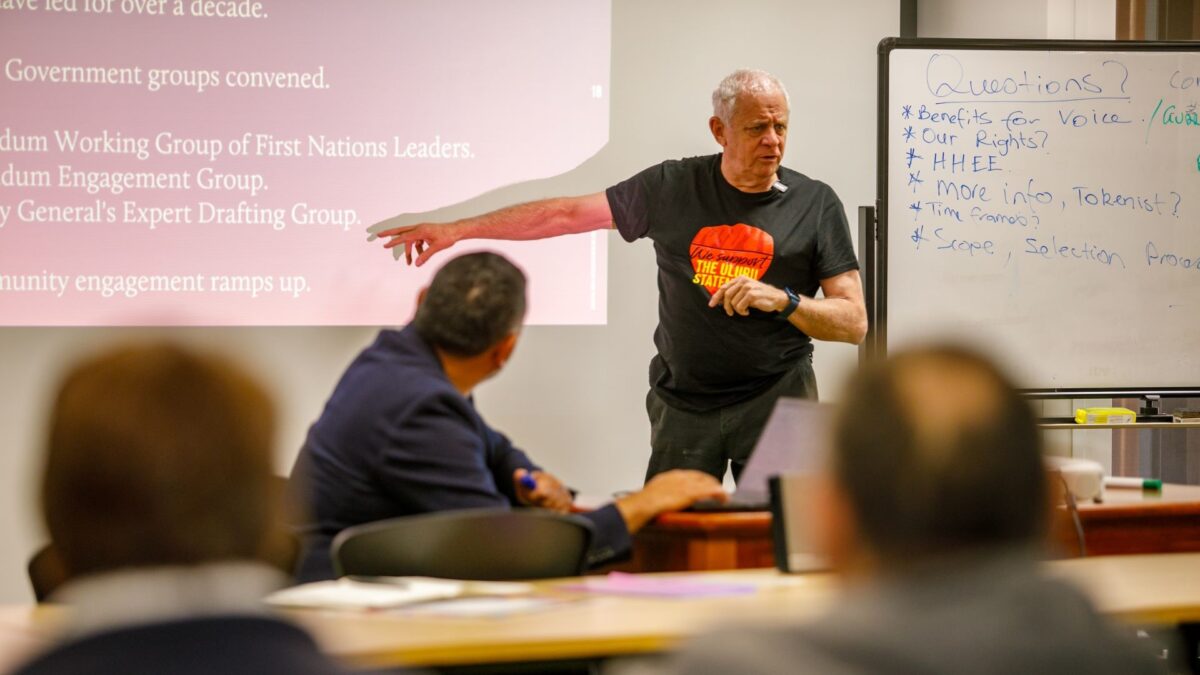“What happens afterwards?” Geoff Scott says that’s up to mob


Uluru Dialogue Director Geoff Scott says First Nations people shouldn't be waiting around to hear about the detail of the Voice - they should be already making plans to shape it. (Image credit: Ben Fry / The Uluru Dialogue)
Director of the Uluru Dialogue, Geoff Scott, says First Nations People should be planning their first moves in the event of a YES result at the upcoming Voice referendum, in order to take full advantage of the huge opportunity gifted to them.
The Uluru Dialogue, the architects of the Uluru Statement, is continuing to travel across New South Wales and Queensland presenting local communities with the facts about the referendum.
“The question I’m hearing the most at the moment at our information sessions with local Indigenous communities is, ‘What happens afterwards?’” Mr Scott said.

Director Geoff Scott informs the local community about the upcoming referendum on the Voice at Batemans Bay in NSW. (Image credit: Ben Fry / The Uluru Dialogue)
“To which my answer is always, ‘That’s when the hard work starts.”
“When they ask who is going to be voted onto the Voice, I tell them it depends on who they want on it. For our team, it’s about putting it back on the people so they know they’re part of the process; that this is their Voice and how successful the Voice is going to be will depend on them and their community.
“That approach seems to resonate with mob because it’s a different perspective.
“People are asking for the detail. ‘Well’, I say, ‘if the detail was worked out without you, you’d be upset, wouldn’t you? So why are you asking for the detail now? You should be getting ready for after the referendum, when the government representatives turn up so you can actually tell them what you want.
“I’ve been telling mob that, after the referendum, the Government will set up a joint house committee and they’ll come and consult you, and that ‘if I were you, I’d be getting ready to write a letter to the committee now’, stressing to them that there must be a presence for the Voice here in your area for your people, so you can take control of your own lives, instead of waiting for someone else to do it.
“That’s what the Voice is about. You taking control, not waiting for someone else.
“When you have those types of conversations with First Nations Peoples, you can see them thinking, ‘Oh, I’ve never thought about it like that.’ That’s how it works. This is what you’ve been asking for and that’s what we’re pushing.”

Geoff Scott sharing facts about the Voice at Dubbo earlier this year. (Image credit: Ben Fry / The Uluru Dialogue)
Over recent weeks the Uluṟu Dialogue has run information sessions for Indigenous communities and as well as for non-Indigenous Aussies at several main regional centres including Brewarrina, Lightning Ridge, Walgett, Narrabri, Moree, Dubbo, Orange, Sydney, Broken Hill, Tamworth, Mudgee, Wellington, Gilgandra, Trangie, Narromine, Gulargambone, Nyngan, Warren, Lithgow, Port Macquarie, Wagga Wagga, Redfern and Nowra.
The Uluru Dialogue’s small band of travelling advocates has also been out and about informing people across Queensland at regional centres including Cooktown, Laura, Cairns, Mossman, Ingham, Innisfail and Mareeba.
The information sessions usually run for an hour and are used to explain to interested people the Who, What, When, Where and Why of both the proposed Voice to Parliament and its main principles, of which there are 19 and are published on the Australian Government’s website.
Mr Scott’s most recent stop was Taree on the NSW mid-north coast, where he presented alongside leading Uluru Statement advocate, Wiradjuri man Roy Ah-See.
“At the Taree event, people were just grateful to be getting the information about the referendum first-hand.
We even had the local pastor there, who was very vocal. He was just getting the record straight so he could tell his parishioners, his mob. He was really into it, asking all types of in-depth questions. He saw that as a service to his people.”
Mr Scott was the Executive Officer to the Referendum Council and was a key leader throughout Uluru Dialogue process.
His previous positions include CEO of the Darkinjung Local Aboriginal Land Council; CEO of the National Congress of Australia’s First Peoples; CEO of the NSW Aboriginal Land Council; Director General NSW Department of Aboriginal Affairs; and Deputy CEO Aboriginal and Torres Strait Islander Commission.
